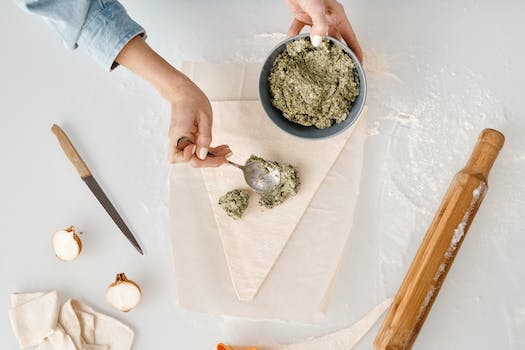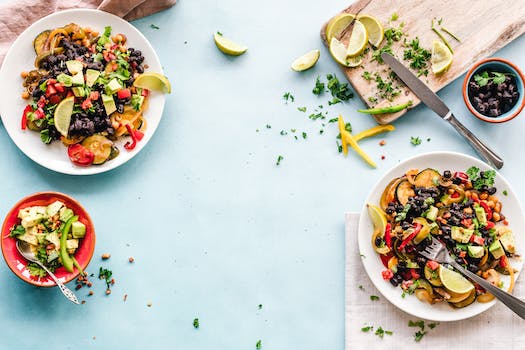
- 1. What is Meal Prepping?
- 1.1. Definition of Meal Prepping
- 1.2. Why Should You Meal Prep?
- 1.3. Who Can Benefit from Meal Prepping?
- 1.4. How to Start Meal Prepping?
- 1.5. Essential Tools for Meal Prepping
- 2. Tips for Easy Meal Prepping for Beginners
- 2.1. Plan Your Meals Ahead
- 2.2. Choose Simple and Easy Recipes
- 2.3. Shop Smartly and Economically
- 2.4. Prep Your Ingredients in Advance
- 2.5. Invest in Quality Storage Containers
- 3. Meal Prep Ideas for Beginners
1. What is Meal Prepping?
Meal prepping refers to the process of organizing and preparing food for future meals. Preparing meals in advance might include anything from preparing and dividing up meals for the week to just chopping up ingredients. Preparing meals ahead of time can help you save time during the week and guarantee that you eat well. When you’re in a pinch for time or energy, it helps you resist the urge to resort to unhealthy fast food or takeout. Meal planning and preparation gives you the power to manage your nutrition and provide your body with the fuel it needs to flourish.
1.1. Definition of Meal Prepping
The term “meal prepping” describes the practice of making food in advance, usually for a week’s worth of meals. Time can be saved and healthy food can be easily available if you plan ahead by cooking in bulk, shopping for ingredients in bulk, and preparing meals in advance. Preparing meals in advance is a common strategy for maintaining a healthy diet, as it reduces the temptation to make unhealthy food choices and helps people save money that would otherwise be spent on eating out.
1.2. Why Should You Meal Prep?
Preparing meals in advance has been increasingly common in recent years, and for good reason. Meals are prepared in advance and stored in the refrigerator or freezer until they are needed. Pre-portioned meals not only help you save time during the week, but they also encourage you to pick healthier options. Preparing meals in advance can help you save money by decreasing the amount of food you throw away and avoiding expensive takeout. In general, planning your meals for the week ahead is a wonderful approach to reduce stress and boost your health.
1.3. Who Can Benefit from Meal Prepping?
When it comes to eating healthily, meal preparing is a fantastic method to save time, money, and effort. Meal preparing is beneficial for anybody, but it is especially useful for the time-pressed, those with special dietary needs, those on a weight loss or muscle-building regimen, and those with dietary restrictions. You can stick to your nutrition goals and increase the likelihood that you’ll eat healthfully by preparing meals in advance so that you always have healthy options available.
1.4. How to Start Meal Prepping?
Though it may seem daunting at first, planning ahead to prepare meals in advance can become a helpful habit for busy people. Choosing a day of the week to plan and prepare meals is the first step in meal preparing. You’re free to pick any time and day that’s convenient for you, including a Sunday afternoon. Plan out what you’ll eat for the week and then make a grocery list based on it. Schedule a block of time to prepare meals and divide them into containers. When you’re pressed for time throughout the week, you can just grab a ready-made meal. Meal planning may be a time-saving and healthful habit with some effort and experimenting.
1.5. Essential Tools for Meal Prepping
The term “meal prepping” refers to the process of organizing and preparing one’s food needs for the upcoming week. Preparing meals in advance for the week include picking recipes, shopping for goods, cooking, and dividing them into manageable portions. This can help you save time, money, and stress while also making it simpler to eat well on a daily basis. Every newbie cook needs a few basic items to get started in the kitchen off on the right foot and make quick work of meal preparation. Tools like a slow cooker or an instant pot, as well as standard measurement implements like spoons and cups, are vital. With these resources, you can make quick work of meal preparation on the weekend and have nutritious food available to you during the week.
2. Tips for Easy Meal Prepping for Beginners
For first-timers, the process of meal preparation may appear daunting. Prepare only a few meals at a time to start until you get the hang of it. Second, to save both time and money, opt for recipes that call for few ingredients. Third, get good containers to keep your meals fresh. Avoid last-minute panic by making a grocery list and menu plans in advance. Use elements that can be included into a variety of dishes, as this is tip number five. If you stick to these guidelines, planning your weekly meals won’t even feel like work.
2.1. Plan Your Meals Ahead
Time, money, and progress toward your health and fitness objectives can all be aided by planning ahead with your meals. Meal planning is most effective when it is based on a well-thought-out plan. If you’re new to meal-prepping, here are some pointers to help you out:
First, pick your recipes carefully; you’ll save time and energy if they’re simple and can be made in bulk.
Create a list of the groceries you’ll need to complete your selected recipes. You can save time and energy by not having to make as many journeys to the grocery shop.
Third, put money into excellent storage containers that can withstand being heated in the microwave and won’t leak. The food will stay fresh longer and spillage will be avoided.
Pick a day of the week to be your “meal prep day” and stick to it. You may plan ahead and not stress about what to have for dinner.
Make a lot of food at once and store it in the fridge for the week. You won’t have to invest as much effort or money into this.
Make use of the freezer and save time during the week by storing meals there to be thawed and re-heated as needed.
Don’t make elaborate dishes; rather, stick to the basics. Avoid complicated recipes and instead choose for those that can be prepared quickly and with few ingredients.
8. prepare some snacks ready – It’s also a good idea to prepare some snacks ready. Avoiding unhealthy snacks during the day will be easier with this strategy.
Don’t be rigid; if you’re tired of eating the same foods, try something new. Do not be afraid to try new things in the kitchen.
Ten. Have fun with it! Meal planning can be a gratifying and enjoyable experience. Take pride in the idea that you are improving your health while reducing your workload and expenses.
2.2. Choose Simple and Easy Recipes
If you’re new to meal preparing, I recommend starting with some tried-and-true staples. This will help you save time and feel less overwhelmed by the task at hand. Avoid complicated recipes and opt instead for those that call for few ingredients and nothing in the way of forward planning. Once you’ve gotten the knack of meal prepping, you can always add more complicated dishes.
2.3. Shop Smartly and Economically
The key to successful meal prepping is strategic and cost-effective grocery shopping. Here are some ways to save time and money at the supermarket:
First, it’s important to plan your meals ahead of time so you know what to buy.
Second, if you want to keep your spending under control, make a list and stick to it.
Third, stock up on discounted seasonal fruit and vegetables.
To save money and prevent food waste, you might think about purchasing frozen fruits and veggies.
To save money, stock up on goods you use often and buy in bulk.
Use retail brands or generics instead of expensive name brands.
Take advantage of discounts and coupons.
Meal preparation can be made more economical with careful grocery shopping.
2.4. Prep Your Ingredients in Advance
Having your items cut and measured out ahead of time can make meal preparation a breeze. It’s best to get all of your prep work done ahead of time, including chopping veggies, measuring ingredients, and dividing up proteins. In addition to relieving tension, this will help you prepare healthy, well-balanced meals with minimal effort. In addition, using high-quality containers can aid in maintaining the freshness and organization of your prepared items throughout the week.
2.5. Invest in Quality Storage Containers
The quality of your food preparation experience can be greatly improved by purchasing sturdy containers. They accomplish double duty by extending the shelf life of your food and making it simple to divide it up into individual servings. You should shop for microwave and dishwasher safe containers that come in a range of sizes. Glass containers are another excellent option because they last a long time and have a little impact on the environment. Meal preparation can be simplified with the help of suitable containers.
3. Meal Prep Ideas for Beginners
For first-timers, meal prepping may seem like an overwhelming chore. But with some forethought and innovation, meal preparing may cut costs, improve nutrition, and free up valuable time. Here are 10 simple meal plans for novices to try:
First, let’s talk about overnight oats.
Salads in Mason jars
Quinoa and roasted vegetables.
4 Crockpot Dishes
Five, hard-cooked eggs
Snack packs of vegetables and hummus
7. Sweet potatoes in the oven
8: Plates with mixed fruit and yogurt
Roll-ups with turkey and cheese. No. 9.
Ten. Smoothie-in-a-pack
If you’re new to meal planning, you should start with these ideas because they’re easy to implement and will yield great results. Try them out and see if they can make your week less stressful.
3.1. Breakfast Meal Prep Ideas
Breakfast is generally the first meal to prepare because there are so many quick and healthy options to choose from. Start your day off right with these easy breakfast meal prep ideas:
First, you can make overnight oats by combining oats, milk, and any additional ingredients you’d like in a container and storing it in the refrigerator. You’ll have a hearty breakfast waiting for you in the morning.
2. Yogurt parfaits: For a protein- and fiber-rich breakfast on the go, layer Greek yogurt, fruit, and granola in a jar.
Create breakfast burritos with scrambled eggs, vegetables, and cheese and freeze them for a quick breakfast on the run.
For a protein-rich breakfast that can be easily reheated, try making egg muffins: simply whisk together eggs and your preferred seasonings, place into a muffin pan, and bake.
Fifth, smoothie packets make it simple to prepare a nutritious and tasty smoothie first thing in the morning. These packs contain pre-measured amounts of frozen fruit and vegetables.
You can get a head start on your day without any worry or difficulty if you follow these easy meal prep tips.
3.2. Lunch Meal Prep Ideas
Lunch is crucial because it gives us the fuel we need to go through the afternoon and the rest of the workday. Finding the time to make a nutritious and appetizing lunch every day, however, can be a challenge. Here’s where prepping meals might be helpful. You may save time and make sure you have a nutritious and filling lunch by preparing it in advance with the help of meal prep. For those just starting to plan their lunches, here are some ideas:
One convenient option is to create salads in mason jars ahead of time. Make a mason jar salad with all your go-to salad fixings and have it on hand in the fridge. Just give it a little shake before eating.
Second, wraps: if you’re on the go during lunchtime, you can’t do much better than a wrap. Make some of your preferred wrap filling and put it in the fridge. Wrap in a tortilla when you’re ready to eat.
Soup is a warm and satisfying lunchtime choice. Make a big pot of your preferred soup and save it in the fridge for later. When you’re hungry, just heat it up and dig in.
Quinoa bowls are a nutritious and filling lunch choice. Prepare a large quantity of quinoa and place it in the fridge. When you’re ready to eat, just pile on your toppings of choice and dig in.
Pasta salad is a healthy and satisfying lunch option. Get some pasta ready and keep it in the fridge. Add your preferred salad toppings and dressing right before serving.
For a fast and simple meal, try a stir-fry. Get all your favorite stir-fry ingredients ready ahead of time and put them in the fridge. When you’re hungry, just heat it up and dig in.
Seventh: Sandwiches, an age-old favorite for lunchtime fare. Get the fixings for your preferred sandwich in the fridge. Just throw everything together and dig in when you’re hungry.
Burrito bowls are a healthy and hearty lunch option. Make a large pot of rice and put it in the fridge for later. When you’re ready to eat, just pile on your preferred burrito bowl toppings and dig in.
Vegetable bowls, which are both nutritious and tasty, are our ninth pick. Get your preferred vegetables ready and keep them in the fridge. When you’re ready to eat, just pile on your toppings of choice and dig in.
Chicken breast is a wonderful source of protein and may be grilled or roasted for a quick and easy meal. Make a big pot of chicken breasts and put them in the fridge to eat later. When you’re ready to eat, just pile on your preferred toppings and dig in.
3.3. Dinner Meal Prep Ideas
Having some weeknight dinners already prepared can be a huge time saver. Here are some simple dinner menu plans for novice cooks to try:
First, grill some chicken breasts and your favorite vegetables after marinating the chicken. Make a big batch and freeze or refrigerate it to eat throughout the week.
create a large quantity of meat sauce and prepare spaghetti squash ahead of time to create spaghetti squash with meat sauce. Make quick work of dinner by mixing and storing in individual portions.
Third, make a stir-fry using your preferred sauce and some chopped up vegetables and protein (tofu, chicken, shrimp, etc.). Distribute and savor all week long.
To make stuffed peppers, first remove the stems and seeds from bell peppers. Prepared rice, ground meat, and chopped vegetables are stuffed. Prepare in bulk and freeze for quick weeknight meals.
Cook some quinoa and serve it in a dish with your preferred toppings, such as vegetables, protein, and sauce. Prepare nutritious and quick meals with portion control.
Make a big pot of chili, soup, or stew in the slow cooker and freeze individual servings for quick weeknight meals.
7 Roast your favorite vegetables and protein on a sheet pan for a quick and easy meal. Serve as a quick weeknight meal with individual servings.
8. Make a large batch of your go-to pasta or rice dish and freeze individual servings for quick weeknight meals.
Prepare ground meat and your preferred toppings for taco or burrito bowls. Serve in individual bowls for quick lunches or dinners over the week.
Ten. Make a salad in a mason jar and take it with you for a quick and healthy meal on the road.
3.4. Snacks and Desserts Meal Prep Ideas
Include snacks and desserts in your meal planning to help control cravings and give yourself a sweet reward at the end of the day. Snacks like hard-boiled eggs, apple slices spread with almond butter, and pre-cut vegetables with hummus are all quick and easy to prepare. Energy balls prepared from dates and almonds are a healthy dessert option, as is homemade granola sprinkled on Greek yogurt. To keep your diet on track with your healthy eating objectives, plan ahead and portion out your snacks and desserts.
3.5. Meal Prep Recipes for Busy Weekdays
Preparing meals ahead of time helps you save time and ensures that you always have nutritious food available. This is especially useful if you don’t have much time to cook during the week. For those hectic weekdays, here are some simple meal-prep ideas:
1. a stir-fried dish with chicken and vegetables
Meatballs made with turkey, served with roasted veggies
Salad of quinoa, chickpeas, and roasted sweet potatoes
Beef stew cooked in a slow cooker
Egg muffins with a ton of veggies
6. Plates of fruit-topped Greek yogurt
Salsa with black beans and corn
8. Chicken fajitas on the grill
9. Salmon and roasted vegetables
Bowls of roasted sweet potatoes and black beans
If you want to start meal preparing but aren’t sure where to start, try some of these easy and delicious ideas for beginners. You may have nutritious meals ready to go for the entire week with just a little bit of planning and preparation.
Conclusion
Even if you’ve never done it before, meal prepping can be a breeze with these 10 simple tips and tricks. These dishes can help you save time and money while sticking to your health objectives, from basic salads to make-ahead breakfast burritos.


